- Home
- Jennifer Niven
All the Bright Places
All the Bright Places Read online
THIS IS A BORZOI BOOK PUBLISHED BY ALFRED A. KNOPF
This is a work of fiction. All incidents and dialogue, and all characters (with the exception of the creators of the World’s Largest Ball of Paint and the Blue Flash and Blue Too roller coasters), are products of the author’s imagination. Any resemblance to persons living or dead is entirely coincidental.
Text copyright © 2015 by Jennifer Niven
Jacket photographs (flowers) copyright © 2015 by Neil Fletcher and Matthew Ward/Getty Images
Hand-lettering and illustrations copyright © 2015 by Sarah Watts
All rights reserved. Published in the United States by Alfred A. Knopf, an imprint of Random House Children’s Books, a division of Random House LLC, a Penguin Random House Company, New York.
Knopf, Borzoi Books, and the colophon are registered trademarks of Random House LLC.
Excerpt from Oh, the Places You’ll Go! by Dr. Seuss, TM and copyright © by Dr. Seuss Enterprises L.P. 1990. Used by permission of Random House Children’s Books, a division of Random House LLC, a Penguin Random House Company, New York. All rights reserved.
Visit us on the Web! randomhouse.com/teens
Educators and librarians, for a variety of teaching tools, visit us at
RHTeachersLibrarians.com
Library of Congress Cataloging-in-Publication Data
Niven, Jennifer.
All the bright places / Jennifer Niven.—1st ed.
p. cm.
Summary: “Told in alternating voices, when Theodore Finch and Violet Markey meet on the ledge of the bell tower at school—both teetering on the edge—it’s the beginning of an unlikely relationship, a journey to discover the ‘natural wonders’ of the state of Indiana, and two teens’ desperate desire to heal and save one another.”—Provided by publisher Includes bibliographical references.
ISBN 978-0-385-75588-7 (trade) — ISBN 978-0-385-75589-4 (lib. bdg.) —
ISBN 978-0-385-75590-0 (ebook) — ISBN 978-0-553-53358-3 (intl. tr. pbk.)
[1. Friendship—Fiction. 2. Suicide—Fiction. 3. Emotional problems—
Fiction. 4. Indiana—Fiction.] I. Title.
PZ7.N6434Al 2015
[Fic]—dc23
2014002238
Random House Children’s Books supports the First Amendment and celebrates the right to read.
v3.1
Contents
Cover
Title Page
Copyright
Dedication
Epigraph
Part 1
Finch: I am awake again. Day 6
Violet: 154 days till graduation
Finch: Day 6 (still) of being awake
Finch’s Rules for Wandering
Violet: 153 days till graduation
Finch: Day 7 of the Awake
Violet: 152 days till graduation
Finch: Day 8 of the Awake
Violet: 151 days till graduation
Finch: Day 9
Violet: 151 days till graduation
Finch: The night of the day my life changed
Violet: 148 days till graduation
Finch: Day 13
Violet: 147–146 days till freedom
Finch: Day 15 (I am still awake)
Violet: 145 days till liberation
Finch: Day 15 (still)
Finch: Days 16 and 17
Violet: 142 days to go
Finch: Day 22 and I’m still here
Violet: 138 days to go
Finch: Days 23, 24, 25 …
Part 2
Violet: 135, 134, 133 days to go
Finch: Day 27 (I am still here)
Violet: 133 days to go
Violet: Saturday
Finch: Day 28
Finch: Day 30 (and I am awake)
Violet: February 2
Violet: The weekend
Finch: The first warm day
Violet: The day of
Finch: The day of
Violet: The morning after
Finch: What follows
Finch: How to survive quicksand
Violet: The week after
Violet: Spring break
Finch: Day 64 of the awake
Finch: Days 65 and 66
Violet: March 10
Finch: Days 66 and 67
Finch: Day 71
Violet: March 18
Finch: Day 75
Violet: March 20
Violet: March 21 and beyond
Finch: Day 80: (a muthaf#@*ing world record)
Violet: The rest of march
Part 3
Violet: April
Violet: April 26
Violet: April 26 (part two)
Violet: May 3
Violet: May—weeks 1, 2, and 3
Violet: Remaining wanderings 1 and 2
Violet: Remaining wanderings 3 and 4
Violet: The last wandering
Violet: June 20
Author’s Note
Acknowledgments
About the Author
The world breaks everyone, and afterward, many are strong at the broken places.
—Ernest Hemingway
FINCH
I am awake again. Day 6.
Is today a good day to die?
This is something I ask myself in the morning when I wake up. In third period when I’m trying to keep my eyes open while Mr. Schroeder drones on and on. At the supper table as I’m passing the green beans. At night when I’m lying awake because my brain won’t shut off due to all there is to think about.
Is today the day?
And if not today—when?
I am asking myself this now as I stand on a narrow ledge six stories above the ground. I’m so high up, I’m practically part of the sky. I look down at the pavement below, and the world tilts. I close my eyes, enjoying the way everything spins. Maybe this time I’ll do it—let the air carry me away. It will be like floating in a pool, drifting off until there’s nothing.
I don’t remember climbing up here. In fact, I don’t remember much of anything before Sunday, at least not anything so far this winter. This happens every time—the blanking out, the waking up. I’m like that old man with the beard, Rip Van Winkle. Now you see me, now you don’t. You’d think I’d have gotten used to it, but this last time was the worst yet because I wasn’t asleep for a couple days or a week or two—I was asleep for the holidays, meaning Thanksgiving, Christmas, and New Year’s. I can’t tell you what was different this time around, only that when I woke up, I felt deader than usual. Awake, yeah, but completely empty, like someone had been feasting on my blood. This is day six of being awake again, and my first week back at school since November 14.
I open my eyes, and the ground is still there, hard and permanent. I am in the bell tower of the high school, standing on a ledge about four inches wide. The tower is pretty small, with only a few feet of concrete floor space on all sides of the bell itself, and then this low stone railing, which I’ve climbed over to get here. Every now and then I knock one of my legs against it to remind myself it’s there.
My arms are outstretched as if I’m conducting a sermon and this entire not-very-big, dull, dull town is my congregation. “Ladies and gentlemen,” I shout, “I would like to welcome you to my death!” You might expect me to say “life,” having just woken up and all, but it’s only when I’m awake that I think about dying.
I am shouting in an old-school-preacher way, all jerking head and words that twitch at the ends, and I almost lose my balance. I hold on behind me, happy no one seems to have noticed, because, let’s face it, it’s hard to look fearless when you’re clutching the railing like a chicken.
“I, Theodore Finch, being of unsound mind, do hereby bequeath all my earthly po
ssessions to Charlie Donahue, Brenda Shank-Kravitz, and my sisters. Everyone else can go f— themselves.” In my house, my mom taught us early to spell that word (if we must use it) or, better yet, not spell it, and, sadly, this has stuck.
Even though the bell has rung, some of my classmates are still milling around on the ground. It’s the first week of the second semester of senior year, and already they’re acting as if they’re almost done and out of here. One of them looks up in my direction, as if he heard me, but the others don’t, either because they haven’t spotted me or because they know I’m there and Oh well, it’s just Theodore Freak.
Then his head turns away from me and he points at the sky. At first I think he’s pointing at me, but it’s at that moment I see her, the girl. She stands a few feet away on the other side of the tower, also out on the ledge, dark-blond hair waving in the breeze, the hem of her skirt blowing up like a parachute. Even though it’s January in Indiana, she is shoeless in tights, a pair of boots in her hand, and staring either at her feet or at the ground—it’s hard to tell. She seems frozen in place.
In my regular, nonpreacher voice I say, as calmly as possible, “Take it from me, the worst thing you can do is look down.”
Very slowly, she turns her head toward me, and I know this girl, or at least I’ve seen her in the hallways. I can’t resist: “Come here often? Because this is kind of my spot and I don’t remember seeing you here before.”
She doesn’t laugh or blink, just gazes out at me from behind these clunky glasses that almost cover her face. She tries to take a step back and her foot bumps the railing. She teeters a little, and before she can panic, I say, “I don’t know what brings you up here, but to me the town looks prettier and the people look nicer and even the worst of them look almost kind. Except for Gabe Romero and Amanda Monk and that whole crowd you hang out with.”
Her name is Violet Something. She is cheerleader popular—one of those girls you would never think of running into on a ledge six stories above the ground. Behind the ugly glasses she’s pretty, almost like a china doll. Large eyes, sweet face shaped like a heart, a mouth that wants to curve into a perfect little smile. She’s a girl who dates guys like Ryan Cross, baseball star, and sits with Amanda Monk and the other queen bees at lunch.
“But let’s face it, we didn’t come up here for the view. You’re Violet, right?”
She blinks once, and I take this as a yes.
“Theodore Finch. I think we had pre-cal together last year.”
She blinks again.
“I hate math, but that’s not why I’m up here. No offense if that’s why you are. You’re probably better at math than I am, because pretty much everyone’s better at math than I am, but it’s okay, I’m fine with it. See, I excel at other, more important things—guitar, sex, and consistently disappointing my dad, to name a few. By the way, it’s apparently true that you’ll never use it in the real world. Math, I mean.”
I keep talking, but I can tell I’m running out of steam. I need to take a piss, for one thing, and so my words aren’t the only thing twitching. (Note to self: Before attempting to take own life, remember to take a leak.) And, two, it’s starting to rain, which, in this temperature, will probably turn to sleet before it hits the ground.
“It’s starting to rain,” I say, as if she doesn’t know this. “I guess there’s an argument to be made that the rain will wash away the blood, leaving us a neater mess to clean up than otherwise. But it’s the mess part that’s got me thinking. I’m not a vain person, but I am human, and I don’t know about you, but I don’t want to look like I’ve been run through the wood chipper at my funeral.”
She’s shivering or shaking, I can’t tell which, and so I slowly inch my way toward her, hoping I don’t fall off before I get there, because the last thing I want to do is make a jackass out of myself in front of this girl. “I’ve made it clear I want cremation, but my mom doesn’t believe in it.” And my dad will do whatever she says so he won’t upset her any more than he already has, and besides, You’re far too young to think about this, you know your Grandma Finch lived to be ninety-eight, we don’t need to talk about that now, Theodore, don’t upset your mother.
“So it’ll be an open coffin for me, which means if I jump, it ain’t gonna be pretty. Besides, I kind of like my face intact like this, two eyes, one nose, one mouth, a full set of teeth, which, if I’m being honest, is one of my better features.” I smile so she can see what I mean. Everything where it should be, on the outside at least.
When she doesn’t say anything, I go on inching and talking. “Most of all, I feel bad for the undertaker. What a shitty job that must be anyway, but then to have to deal with an asshole like me?”
From down below, someone yells, “Violet? Is that Violet up there?”
“Oh God,” she says, so low I barely hear it. “OhGodohGodohGod.” The wind blows her skirt and hair, and it looks like she’s going to fly away.
There is general buzzing from the ground, and I shout, “Don’t try to save me! You’ll only kill yourself!” Then I say, very low, just to her, “Here’s what I think we should do.” I’m about a foot away from her now. “I want you to throw your shoes toward the bell and then hold on to the rail, just grab right onto it, and once you’ve got it, lean against it and then lift your right foot up and over. Got that?”
She nods and almost loses her balance.
“Don’t nod. And whatever you do, don’t go the wrong way and step forward instead of back. I’ll count you off. On three.”
She throws her boots in the direction of the bell, and they fall with a thud, thud onto the concrete.
“One. Two. Three.”
She grips the stone and kind of props herself against it and then lifts her leg up and over so that she’s sitting on the railing. She stares down at the ground and I can see that she’s frozen again, and so I say, “Good. Great. Just stop looking down.”
She slowly looks at me and then reaches for the floor of the bell tower with her right foot, and once she’s found it, I say, “Now get that left leg back over however you can. Don’t let go of the wall.” By now she’s shaking so hard I can hear her teeth chatter, but I watch as her left foot joins her right, and she is safe.
So now it’s just me out here. I gaze down at the ground one last time, past my size-thirteen feet that won’t stop growing—today I’m wearing sneakers with fluorescent laces—past the open windows of the fourth floor, the third, the second, past Amanda Monk, who is cackling from the front steps and swishing her blond hair like a pony, books over her head, trying to flirt and protect herself from the rain at the same time.
I gaze past all of this at the ground itself, which is now slick and damp, and imagine myself lying there.
I could just step off. It would be over in seconds. No more “Theodore Freak.” No more hurt. No more anything.
I try to get past the unexpected interruption of saving a life and return to the business at hand. For a minute, I can feel it: the sense of peace as my mind goes quiet, like I’m already dead. I am weightless and free. Nothing and no one to fear, not even myself.
Then a voice from behind me says, “I want you to hold on to the rail, and once you’ve got it, lean against it and lift your right foot up and over.”
Like that, I can feel the moment passing, maybe already passed, and now it seems like a stupid idea, except for picturing the look on Amanda’s face as I go sailing by her. I laugh at the thought. I laugh so hard I almost fall off, and this scares me—like, really scares me—and I catch myself and Violet catches me as Amanda looks up. “Weirdo!” someone shouts. Amanda’s little group snickers. She cups her big mouth and aims it skyward. “You okay, V?”
Violet leans over the rail, still holding on to my legs. “I’m okay.”
The door at the top of the tower stairs cracks open and my best friend, Charlie Donahue, appears. Charlie is black. Not CW black, but black-black. He also gets laid more than anyone else I know.
; He says, “They’re serving pizza today,” as if I wasn’t standing on a ledge six stories above the ground, my arms outstretched, a girl wrapped around my knees.
“Why don’t you go ahead and get it over with, freak?” Gabe Romero, better known as Roamer, better known as Dumbass, yells from below. More laughter.
Because I’ve got a date with your mother later, I think but don’t say because, let’s face it, it’s lame, and also he will come up here and beat my face in and then throw me off, and this defeats the point of just doing it myself.
Instead I shout, “Thanks for saving me, Violet. I don’t know what I would’ve done if you hadn’t come along. I guess I’d be dead right now.”
The last face I see below belongs to my school counselor, Mr. Embry. As he glares up at me, I think, Great. Just great.
I let Violet help me over the wall and onto the concrete. From down below, there’s a smattering of applause, not for me, but for Violet, the hero. Up close like this, I can see that her skin is smooth and clear except for two freckles on her right cheek, and her eyes are a gray-green that makes me think of fall. It’s the eyes that get me. They are large and arresting, as if she sees everything. As warm as they are, they are busy, no-bullshit eyes, the kind that can look right into you, which I can tell even through the glasses. She’s pretty and tall, but not too tall, with long, restless legs and curvy hips, which I like on a girl. Too many high school girls are built like boys.
“I was just sitting there,” she says. “On the railing. I didn’t come up here to—”
“Let me ask you something. Do you think there’s such a thing as a perfect day?”
“What?”
“A perfect day. Start to finish. When nothing terrible or sad or ordinary happens. Do you think it’s possible?”
“I don’t know.”
“Have you ever had one?”
“No.”
“I’ve never had one either, but I’m looking for it.”
She whispers, “Thank you, Theodore Finch.” She reaches up and kisses me on the cheek, and I can smell her shampoo, which reminds me of flowers. She says into my ear, “If you ever tell anyone about this, I’ll kill you.” Carrying her boots, she hurries away and out of the rain, back through the door that leads to the flight of dark and rickety stairs that takes you down to one of the many too-bright and too-crowded school hallways.

 Ada Blackjack: A True Story of Survival in the Arctic
Ada Blackjack: A True Story of Survival in the Arctic The Aqua Net Diaries: Big Hair, Big Dreams, Small Town
The Aqua Net Diaries: Big Hair, Big Dreams, Small Town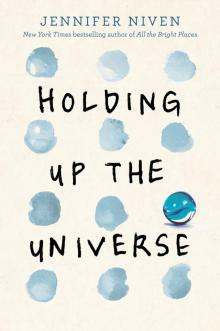 Holding Up the Universe
Holding Up the Universe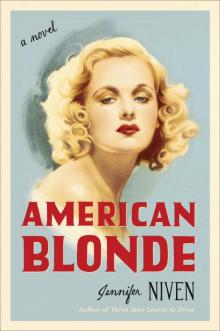 American Blonde
American Blonde All the Bright Places
All the Bright Places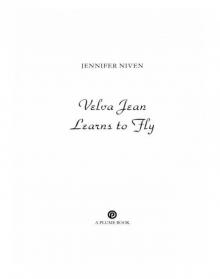 Velva Jean Learns to Fly
Velva Jean Learns to Fly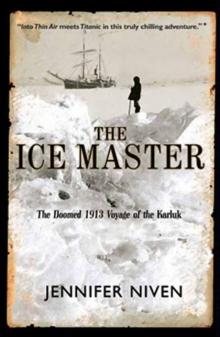 The Ice Master
The Ice Master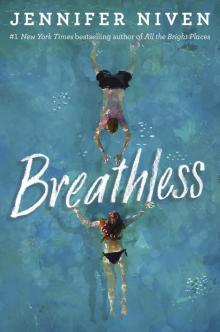 Breathless
Breathless The Aqua Net Diaries
The Aqua Net Diaries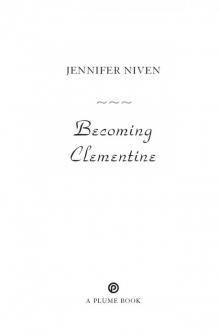 Becoming Clementine: A Novel
Becoming Clementine: A Novel